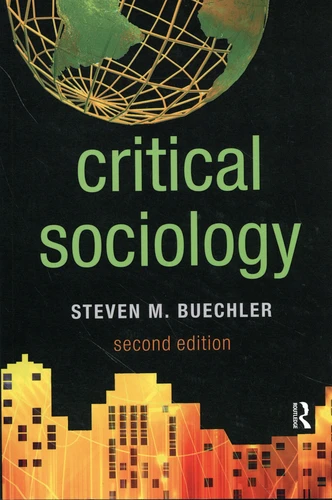Critical Sociology
2nd edition
Par : Formats :
- Paiement en ligne :
- Livraison à domicile ou en point Mondial Relay indisponible
- Retrait Click and Collect en magasin gratuit
- Réservation en ligne avec paiement en magasin :
- Indisponible pour réserver et payer en magasin
- Nombre de pages307
- PrésentationBroché
- FormatGrand Format
- Poids0.466 kg
- Dimensions15,2 cm × 22,9 cm × 1,7 cm
- ISBN978-1-61205-625-8
- EAN9781612056258
- Date de parution30/06/2014
- ÉditeurRoutledge
Résumé
Critical Sociology is a thoroughly revised, updated, and sophisticated introduction to the sociological perspective as a critical lens on society. Much has happened since the first edition : the Great Recession, the Obama presidency, the burgeoning role of social media, and recent global social movements such as the Tea Party, Occupy Wall Street, and the Arab Spring. In this second edition, Buechler discusses the changing relationship between social movements and democracy.
The book opens with chapters on how to think sociologically ; an overview of scientific, humanistic, and critical schools of sociology ; and a detailed exposition of the critical tradition. Buechler applies this tradition to economics, politics, and culture ; to class, race, and gender ; to individualism, self, and identity ; and to globalization.
The book opens with chapters on how to think sociologically ; an overview of scientific, humanistic, and critical schools of sociology ; and a detailed exposition of the critical tradition. Buechler applies this tradition to economics, politics, and culture ; to class, race, and gender ; to individualism, self, and identity ; and to globalization.
Critical Sociology is a thoroughly revised, updated, and sophisticated introduction to the sociological perspective as a critical lens on society. Much has happened since the first edition : the Great Recession, the Obama presidency, the burgeoning role of social media, and recent global social movements such as the Tea Party, Occupy Wall Street, and the Arab Spring. In this second edition, Buechler discusses the changing relationship between social movements and democracy.
The book opens with chapters on how to think sociologically ; an overview of scientific, humanistic, and critical schools of sociology ; and a detailed exposition of the critical tradition. Buechler applies this tradition to economics, politics, and culture ; to class, race, and gender ; to individualism, self, and identity ; and to globalization.
The book opens with chapters on how to think sociologically ; an overview of scientific, humanistic, and critical schools of sociology ; and a detailed exposition of the critical tradition. Buechler applies this tradition to economics, politics, and culture ; to class, race, and gender ; to individualism, self, and identity ; and to globalization.


